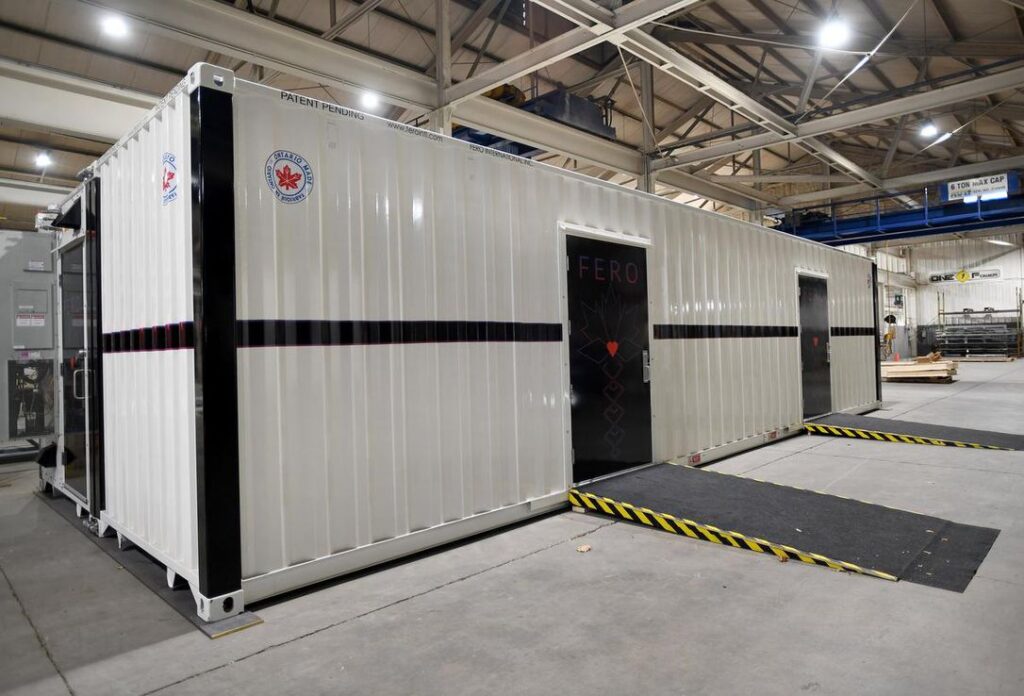[ale_divider style=”thin” text=”notext”] Divider Text [/ale_divider]
This article appeared on thespec.com by Maria Iqbal. To read the original post Click Here.
[ale_divider style=”thin” text=”notext”] Divider Text [/ale_divider]
/https://www.thespec.com/content/dam/thespec/news/hamilton-region/2020/12/10/hamilton-company-develops-hospital-rooms-from-shipping-containers-during-covid-19/fero4.jpg)
A Hamilton company is in talks with the province about funding a creative solution to the COVID-19 crisis in hospitals and long-term care.
Fero International Inc., which specializes in disaster relief solutions, has developed ICUs and operating rooms out of shipping containers. A simpler version of the units can be used to isolate infected patients in long-term care.
And, their CEO says, the company will soon work on developing units to support distribution of the COVID-19 vaccine, expected to arrive in Canada this month.
/https://www.thespec.com/content/dam/thespec/uploads/2020/12/10/sabrina-0.jpg)
“Our goals are to save lives where and when needed,” said CEO Sabrina Fiorellino. “The elderly in the homes are dying, and I think us as a population are not doing enough to protect the elderly.”
/https://www.thespec.com/content/dam/thespec/uploads/2020/12/10/unit-0.jpg)
Fero is building the medical units at AVL Manufacturing on Queen Street North. AVL was previously developing its own triage units for COVID-19 patients, but Fiorellino says once the company’s owners and owners of another company, Eightx40 Management Inc., came together to found Fero, they combined their expertise to developed new units.
“When you’re intubating a patient with a vent, aerosols get in the air, and this puts people at risk,” said Fiorellino, who has a background in law and construction. “The recommendation when you’re doing this type of procedure is to do it in a negative pressure room.”
/https://www.thespec.com/content/dam/thespec/uploads/2020/12/10/service-0.jpg)
The units can be connected together with an airtight seal, and attach to an existing building or exist separately.
Each room costs $100,000 to $300,000, significantly lower than the standard cost of $800,000 and $2 million for traditional infrastructure, added Fiorellino, noting the shipping containers keep building and transportation costs down.
After viewing a video of Fero’s medical units, Dr. Zain Chagla, associate professor of medicine at McMaster University, said the proposal looked promising. He noted the units didn’t need a big investment, and many hospitals and long-term care facilities have access to plots of land large enough to accommodate the extra units.
“It may help with infection control,” said Chagla, adding that in an outbreak, there can be an “explosion of patients” within a few days if they’re not isolated properly.
The University Health Network assessed the units over a week in October and gave a report suggesting “minor modifications” before deploying the units in hospitals, Fiorellino said.
So far, Toronto General Hospital and Toronto Western Hospital have expressed interest in the units. Other hospitals are also following the latest developments, the CEO said, noting talks are progressing with the government on possible funding.
For long-term care, the company would create a facility where COVID-19 patients could isolate.
“We’d still need to work and make sure there was a manager there, that they were staffed properly,” Fiorellino said.
“We don’t only filter incoming air but we filter outgoing air, so even when you’re walking around the units, you’re not going to get sick,” she said.
Fiorellino said the long-term care units could be deployed on short notice since they have fewer requirements.
“If we had an order tomorrow, we could build them,” she said, noting Ontario Long Term Care Association and AdvantAge Ontario have been “very supportive” of the idea.
She’s hoping the government can help with funding, but says if the talks don’t work out, she plans to raise money to bring the units to hospitals and long-term care homes themselves.
“It’s important for us to do that,” she said. “We want to make sure that we’re helping in the efforts.”





